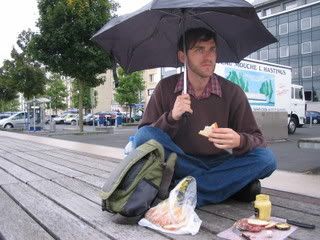
Last night, the night of our arrival in Tangier was not only grey and rainy. It was also Eid al-Fitr. As of today, Ramadan is officially over, and good muslims are once again free to eat, drink, smoke, and have sex during the daylight hours. Eid al-Fitr - the Feast of Breaking the Fast - begins at sundown on the last day of Ramadan.
The Feast is not a big, crazy-go-nuts, party-in-the-street type of feast - something which became quite obvious to Lee and I as we wandered the rainy, deserted streets of Tangier in search of dinner last night. We had umbrellas, but by the time we found a place that was both open and sold food, we drenched below the knees and damp below the shoulders. The only other occupants of the restaurant were a quiet German couple, and a couple of old Moroccan men who didn't eat, but just sat at a table and chatted with the waiter. It had the languid, vaguely melancholy vibe of a restaurant on Christmas Eve.
Late into the night, from the house below our hotel, we heard the sound of people laughing and shouting, all to the soundtrack of Justin Timberlake and Moroccan pop music. Early the next morning, with the skies clearing slightly, we heard, from far off, the sound of a horn being blown, and of drums, and of a muezzin singing the extended version of Allah hu Akbar. We wandered around quite a bit, but everything was closed, nobody was on the street, and we didn't have an in.
* * * * * *
 Covaleda was unseasonbly sunny when we were there. My uncle Antonio, who was born in the small Castillian village near Soria, and aunt Tab, who was born in California and married Antonio twenty-some years ago, both commented on how lucky we were that it wasn't freezing cold and rainy. It had been drizzling constantly until we got there.
Covaleda was unseasonbly sunny when we were there. My uncle Antonio, who was born in the small Castillian village near Soria, and aunt Tab, who was born in California and married Antonio twenty-some years ago, both commented on how lucky we were that it wasn't freezing cold and rainy. It had been drizzling constantly until we got there.The rain was good for the mushrooms, though, and that's why we were there - to pick and cook and eat the wild mushrooms that grow in the forest around Covaleda. (The forest, incedentaly, was a gift from a Spanish king to the people of Covaleda to show his appreciation for a lovely hunting trip he had enjoyed in it. That was several hundred years ago, and the forest is still collectively owned by the people of Covaleda.)
The family house in Covaleda has roughly twenty bedrooms, a glazed tile roof, a tower, and a generations-long history of intrigue - full of blackmail, disinheritance, lost fortunes, and great one-liners with all makings of a sweeping epic novel.
Days at the house were spent cleaning mushrooms, hearing stories, and eating more than I ever considered possible in a single day. Here is an example of a one day's eating schedule:
11am - Breakfast of pastries and cafe con leche
2pm - Afternoon beer, tapas and socializing at at least two bars
4pm - Lunch. First potato and fresh mushroom stew. Then grilled lamb chops. Then pork chops. Then industrial strenght aguardiente and patxaran, a sweet, basque liquer.
5:30 - Nap. Direly needed.
8pm - Evening beers and tapas, again at no fewer than two bars.
Midnight - Dinner of baked chicken and bean-and-ham stew.
I was informed by Tab, and by my uncle's sister Pili, that this is in no way considered excessive.
For two days of the Virgen del Pilar holiday weekend, we ate and drank and picked mushrooms, and heard stories, and then we headed out of Covaleda back to my aunt and uncle's flat in Madrid. This was my first trip to Covaleda since I was a child traveling with my parents, and I certainly hope I don't have to wait another 20 years before I go back again.
Covaleda, I have been told, is like any of hundreds of other small towns that you pass through on busses and trains in Europe. It's not even on of the prettiest or quaintest. But its the town where I have an in, and that makes all the difference.

No comments:
Post a Comment